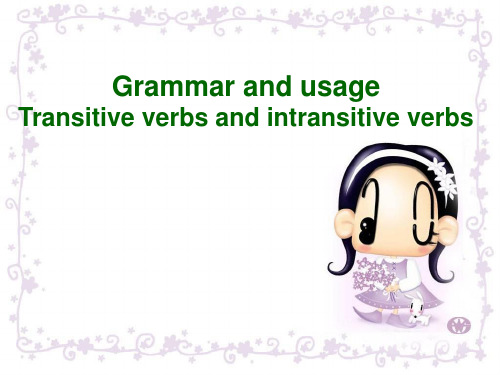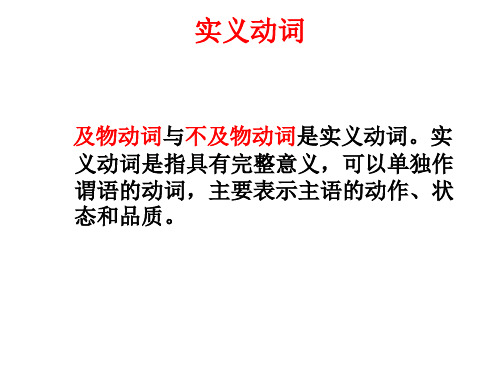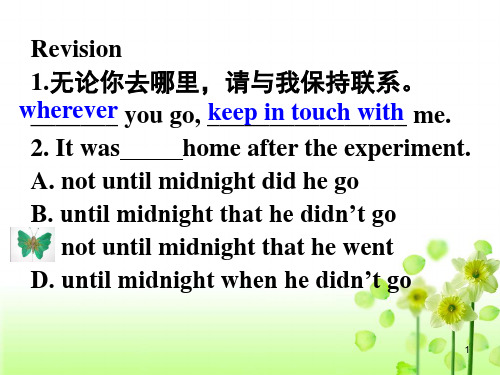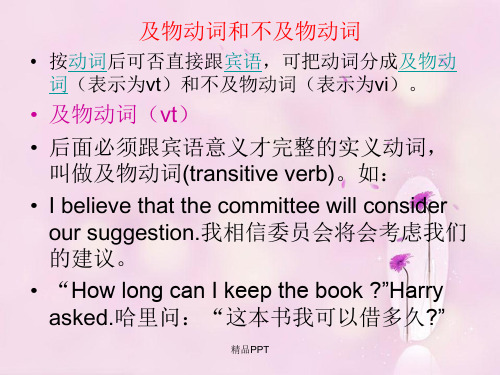及物和不及物动词的用法 优质课件
合集下载
及物动词和不及物动词PPT课件

-
6
Tips
1.既可以用作及物又可以用作不及物的动词
(1)其意义不变。如begin, start, answer, sing, close, consider, insist, read, learn, prepare, pay, hurt, improve....
eg: everybody , our game begins.
let us begin our game.
Wash your hands before meals.
Does this cloth wash well?
She can write poems in English.
She writes very well.
-
7
(2)其意义不同。
beat vi.跳动
Grammar and usage
Transitive verbs and intransitive verbs
Lead-in
• What’s the biggest difference between transitive and intmerican, Philo Farnsworth, made important breakthroughs in the development of the TV in the late 1920s and early 1930s.
She came last week.
What happened yesterday?
Bored with life in the city, he moved to a remote village accessible only by boat.
I listened to music before I could speak.
及物与不及物动词.ppt

• Cindy is running very fast. • The water rose gradually. • The children are listening to the music
及物动词
• 后面能跟宾语的动词称为及物动词。可分 为跟单宾语的及物动词、跟双宾语的及物 动词、跟复合结构的及物动词等。
• She is laughing at the crippled man. • She played violin very well. • I returned the storybook to him. • We all believe him honest and kind. • My little sister ate my cake. • Please look at the blackboard.
练习:区分以下句子哪些是及物动词,哪些 是不及物动词(及物动词后带什么成分)
• He escaped. • You can borrow one book at a time
from the library. • Who will answer this question? • The balloon burst. • The big cat attacked the little dog. • Tom liked basketball.
• I returned him the storybook. • They show us their books.
• (3)常见的跟宾think
• Mother often tells me to make friends carefully.
实义动词
及物动词与不及物动词是实义动词。实 义动词是指具有完整意义,可以单独作 谓语的动词,主要表示主语的动作、状 态和品质。
及物与不及物动词PPT课件

die, belong, fall, exist, rise, arrive, sit, sail, hurry, fail, succeed... 既作及物又作不及物的动词,其意义不变。 eg: Everybody , our game begins. (vi.开始)
Let us begin our game. (vt.开始) 类似的还有: start, answer, sing, close, consider,
既作及物又作不及物的动词,其意义完全不同。
eg: we saw the mountain when the clouds lifted. ( vi. 烟雾的“消散”) He lifted his glass and drank. ( vt. 升高;举起)
类似的还有:beat vi. 跳动 vt. 敲、打; grow vi. 生长 vt. 种植; hang vi. 悬挂 vt. 绞死; play vi. 玩耍 vt. 打(牌/球), 演奏 smell vi.发出(气味) vt. 嗅; speak vi.讲话vt. 说(语言) operate vi. 动手术 vt. 操作; ring vi. (电话、铃)响 vt. 打电话;
△常接现在分词和过去分词作宾补的动词有: have, let, make, get, keep, catch, find, see, watch, notice, hear等。
(二)不及物动词(vi. ):不及物动词后不能直接 跟有动作的对象(即宾语)。若要跟宾语,必须 先在其后加上某个介词。 如: Miss White told me not to write on the wall.
He advised me to stay at home. △常见的带to不定式作宾补的动词有:
Let us begin our game. (vt.开始) 类似的还有: start, answer, sing, close, consider,
既作及物又作不及物的动词,其意义完全不同。
eg: we saw the mountain when the clouds lifted. ( vi. 烟雾的“消散”) He lifted his glass and drank. ( vt. 升高;举起)
类似的还有:beat vi. 跳动 vt. 敲、打; grow vi. 生长 vt. 种植; hang vi. 悬挂 vt. 绞死; play vi. 玩耍 vt. 打(牌/球), 演奏 smell vi.发出(气味) vt. 嗅; speak vi.讲话vt. 说(语言) operate vi. 动手术 vt. 操作; ring vi. (电话、铃)响 vt. 打电话;
△常接现在分词和过去分词作宾补的动词有: have, let, make, get, keep, catch, find, see, watch, notice, hear等。
(二)不及物动词(vi. ):不及物动词后不能直接 跟有动作的对象(即宾语)。若要跟宾语,必须 先在其后加上某个介词。 如: Miss White told me not to write on the wall.
He advised me to stay at home. △常见的带to不定式作宾补的动词有:
及物与不及物动词课件

单项选择练习
总结词
通过选择题的形式,让学生根据句意判断动词的及物或不及物属性。
详细描述
设计一系列句子,每个句子中包含一个及物或不及物动词,要求学生根据句意判断该动词的属性,并从给定的选 项中选择正确的答案。
翻译练习
总结词
通过中英文互译的方式,让学生在实际运用 中掌握及物与不及物动词的用法。
详细描述
03
不及物动词的用法
常用不及物动词举例
起床:get up
睡觉:go to bed
跑步:run
唱歌:sing
游泳: swim
跳舞: dance
不及物动词的时态变化
现在时
run -> runs (单数第三人称形式)
进行时
running -> was running (过去进行时)
过去时
ran -> ran (过去式)
不及物动词的定义
不及物动词
表示动作或行为不涉及其他对象的动 词,通常不需要宾语即可完整表达意 义。
例如
sleep(睡觉)、run(跑步)、jump (跳跃)等。
及物与不及物动词的区分
语义区别
及物动词通常表示对某个对象 产生直接影响的动作,而不及 物动词则表示某个对象自身的
状态或变化。
宾语需求
及物动词通常需要宾语来完整 表达意义,而不及物动词则不 需要。
习惯用法辨析
总结词
一些动词虽然通常作为及物动词使用, 但在某些固定搭配中却作为不及物动词。
VS
详细描述
例如,“dream”通常作为及物动词使用, 但在固定搭配“dream up”中则作为不 及物动词,表示“想象”或“创造”。因 此,对于一些习惯用法需要特别注意,避 免混淆。
及物动词和不及物动词优秀课件

及物动词和不及物动词优秀课 件
动词根据其后是否带有宾语,可分为两类, 分别是:及物动词(Transitive Verb) 缩写形式 vt.
不及物动词(Intransitive Verb)缩写形式 vi.
不及物动词 : 不及物动词本身意义完整,后面不需要接宾语。 例如:
The rain stopped. 雨停了。
c.既可以用作及物又可以用作不及物的动词,其意义不变。 如begin 都是作"开始"讲。 everybody , our game begins. let us begin our game. 类似的还有:start, answer, sing, close, consider, insist, read, learn, prepare, pay, hurt, improve....
b.主要用作不及物的动词。不及物动词后面不跟宾语。只能用与:"主+谓"结 构。 This is the room where I once lived. 类似的还有:agree, go, work, listen, look, come, die, belong, fall, exist, rise, arrive, sit, sail, hurry, fail, succeed....
d.既可以用作及物又可以用作不及物的动词,其意义完全不同。 这类动词作不及物动词是一个意义;而作及物动词时却是另一个意义。 如lift作不及物动词时是指烟雾的"消散"。 we saw the mountain when the clouds lifted. 作及物动词时是"升高;举起"。 He lifted his glass and drank. 类似的还有:beat vi.跳动 vt. 敲、打; grow vi.生长 vt. 种植
动词根据其后是否带有宾语,可分为两类, 分别是:及物动词(Transitive Verb) 缩写形式 vt.
不及物动词(Intransitive Verb)缩写形式 vi.
不及物动词 : 不及物动词本身意义完整,后面不需要接宾语。 例如:
The rain stopped. 雨停了。
c.既可以用作及物又可以用作不及物的动词,其意义不变。 如begin 都是作"开始"讲。 everybody , our game begins. let us begin our game. 类似的还有:start, answer, sing, close, consider, insist, read, learn, prepare, pay, hurt, improve....
b.主要用作不及物的动词。不及物动词后面不跟宾语。只能用与:"主+谓"结 构。 This is the room where I once lived. 类似的还有:agree, go, work, listen, look, come, die, belong, fall, exist, rise, arrive, sit, sail, hurry, fail, succeed....
d.既可以用作及物又可以用作不及物的动词,其意义完全不同。 这类动词作不及物动词是一个意义;而作及物动词时却是另一个意义。 如lift作不及物动词时是指烟雾的"消散"。 we saw the mountain when the clouds lifted. 作及物动词时是"升高;举起"。 He lifted his glass and drank. 类似的还有:beat vi.跳动 vt. 敲、打; grow vi.生长 vt. 种植
及物动词和不及物动词的区别(课堂PPT)

interest.
每个人都很有兴趣地听讲课。(to不可省去)
(比较:We all heard the lecture.)
Do they agree to the plan?
他们同意这个计划吗?(to不可省去)
9
b)有的动词在英语里能用作及物动词, 而在汉语里则不能用作及物动词,
如serve为…服务。 Our children are taught to serve the
竟加什么介词就得看动词本身和所要表达
的意义了 (look after, agree with, take
after)
3. 不及物动词(vi)(intransitive verb)
4. 及物动词(vt)( transitive verb)
2
及物动词(vt)
后面必须跟宾语意义才完整的实义动词,叫做 及物动词。
6
b)兼作及物动词和不及物动词时,有时 意义不尽相同。
Wash your hands before meals. 饭前要洗手。 Does this cloth wash well? 这布经得起洗吗?
7
与汉语的比较
有时英语动词的及物和不及物的用法, 与汉语的用法不一样,请注意下列两种 情况:
a)有的动词在英语里只能用作不及物动 词,而汉语则可用作及物动词,
She began working as a librarian after she
left school.
她毕业后当就开始图书馆管理员。(began作
及物动词)
5
When did they leave Chicago? 他们是什么时候离开芝加哥的?(leave
作及物动词) They left last week. 他们是上周离开的。(left 作不及物动词)
高中英语及物动词及不及物动词用法及区别(课堂PPT)

C. not until;
that the boy began to regret wasting
D. until; did the boy begin to regret to waste
4. It was not until dark he found he thought was the correct way to solve the problem.
7
Learning aims:
We will
• Learn about the differences between Vt. and Vi.
• Learn how to use them.
• Focus on some testing points about them.
1)Vt. or Vi.选择
5
M7U1
Grammar and usage
Transitive verbs and intransitive verbs 及物动词和不及物动词
6
What is the difference of “begin” in the two sentences? Class begins! Today I’ll begin our lesson with a question.
1
3. It was the exam results were known a lot of time on computer games.
A. not until;
did the boy begin to regret having wasted
B. until;
that the boy began to regret to have wasted
及物和不及物动词

及物动词和不及物动词
• 按动词后可否直接跟宾语,可把
• 及物动词(vt)
• 后面必须跟宾语意义才完整的实义动词, 叫做及物动词(transitive verb)。如:
• I believe that the committee will consider our suggestion.我相信委员会将会考虑我们 的建议。
时候离开芝加哥的?(leave 作及物动词) • They left last week. (left 作不及物动词)
精品PPT
两用动词
• b)兼作及物动词和不及物动词时,有时意义不尽 相同。
• 如: • Wash your hands before meals.饭前要洗手。 • Does this cloth wash well? 这布经得起洗吗?
精品PPT
两用动词
• 类似的还有: • beat vi.跳动 vt. 敲、打; • grow vi.生长 vt. 种植 • play vi.玩耍 vt. 打(牌、球),演奏 • smell vi.发出(气味) vt. 嗅 • ring vi.(电话、铃)响 vt.打电话
speak vi.讲话 vt. 说(语言) • hang vi. 悬挂 vt. 绞死 • operate vi.动手术 vt. 操作
• “How long can I keep the book ?”Harry asked.哈里问:“这本书我可以借多久?”
精品PPT
及物动词和不及物动词
• 不及物动词(vi) • 本身意义完整,后面不须跟宾语的实义动
词,叫做不及物动词(intransitive verb)。如: • Birds can fly. 鸟会飞。 • She spoke at the meeting yesterday
• 按动词后可否直接跟宾语,可把
• 及物动词(vt)
• 后面必须跟宾语意义才完整的实义动词, 叫做及物动词(transitive verb)。如:
• I believe that the committee will consider our suggestion.我相信委员会将会考虑我们 的建议。
时候离开芝加哥的?(leave 作及物动词) • They left last week. (left 作不及物动词)
精品PPT
两用动词
• b)兼作及物动词和不及物动词时,有时意义不尽 相同。
• 如: • Wash your hands before meals.饭前要洗手。 • Does this cloth wash well? 这布经得起洗吗?
精品PPT
两用动词
• 类似的还有: • beat vi.跳动 vt. 敲、打; • grow vi.生长 vt. 种植 • play vi.玩耍 vt. 打(牌、球),演奏 • smell vi.发出(气味) vt. 嗅 • ring vi.(电话、铃)响 vt.打电话
speak vi.讲话 vt. 说(语言) • hang vi. 悬挂 vt. 绞死 • operate vi.动手术 vt. 操作
• “How long can I keep the book ?”Harry asked.哈里问:“这本书我可以借多久?”
精品PPT
及物动词和不及物动词
• 不及物动词(vi) • 本身意义完整,后面不须跟宾语的实义动
词,叫做不及物动词(intransitive verb)。如: • Birds can fly. 鸟会飞。 • She spoke at the meeting yesterday
及物动词与不及物动词的运用.ppt

S + __V_i_. ___ 5. Many different people contributed to the development of TV.
S + __V_i_. __+__P_r_e_p_.+ O
Task 2
Discuss the differences between vt. and vi. in groups.
as a gift.
_V_t_.__ +__O__(间_宾_)+__O__(_直_宾_)
3. This will soon make DVDS things of the past.
_V__t.__ +__O__(宾__)+__O__c_(_宾_补_)
4. More challenges lie ahead of me.
2. Do you still remember the holiday (_w_h_i_c_h_/_t_h_a_t)we spent in that village? 3. It is thinking that make __w_h_a_t_ we read ours.
4. Talent and intelligence is not w__h_e_r_e the key to higher grades only lies.
Right or wrong: • When wdaids the accident occurred? • His novel sells well so that most of the novels
have been sold out. • We should try our best to serve fporeoppeloeple. • The fresh air will benefit yfrooum you. 1.Her parents wanted to marry her to a rich man
S + __V_i_. __+__P_r_e_p_.+ O
Task 2
Discuss the differences between vt. and vi. in groups.
as a gift.
_V_t_.__ +__O__(间_宾_)+__O__(_直_宾_)
3. This will soon make DVDS things of the past.
_V__t.__ +__O__(宾__)+__O__c_(_宾_补_)
4. More challenges lie ahead of me.
2. Do you still remember the holiday (_w_h_i_c_h_/_t_h_a_t)we spent in that village? 3. It is thinking that make __w_h_a_t_ we read ours.
4. Talent and intelligence is not w__h_e_r_e the key to higher grades only lies.
Right or wrong: • When wdaids the accident occurred? • His novel sells well so that most of the novels
have been sold out. • We should try our best to serve fporeoppeloeple. • The fresh air will benefit yfrooum you. 1.Her parents wanted to marry her to a rich man
- 1、下载文档前请自行甄别文档内容的完整性,平台不提供额外的编辑、内容补充、找答案等附加服务。
- 2、"仅部分预览"的文档,不可在线预览部分如存在完整性等问题,可反馈申请退款(可完整预览的文档不适用该条件!)。
- 3、如文档侵犯您的权益,请联系客服反馈,我们会尽快为您处理(人工客服工作时间:9:00-18:30)。
有些动词既可作及物动词, 又可作不及物动词。
1. 意义不变:
Everybody , our game begins.(Vi)
Let us begin our game. (vt)
类似的还有:
start, answer, sing, close, consider, insist, read, learn, prepare, pay, hurt, improve....
He lifted shpiseagklassvai.讲nd话dravtn.k说. ((语vt言, )举起)
hang vi. 悬挂 vt. 绞死 operate vi.动手术 vt. 操作
有些及物动词后面可加上某些副词,作补语
(补类充似说明的宾还语有的:内容或状态)
put on 、 put off 、 put away 、put up 、put down Thpouutsaonudt、s otuf rpneopnl、e wteuren aotffthe airport to see them off. Seuttsinegutph、e cchuatirupas、idee,ahteuspa、t onsethlleofulot、or.cheer up Latshtinikghutp's、sthroanngdwinin、d nhearnlyd toouotk、ththerorowofaowffa!y / off Thweasktreikuerps、toowkriotevedrotwhen、facletot rdieosw. n···
完整后面不需跟宾语的实义动词,用vi表示。
如:My watch stopped.
不及物动词后面不能直接跟宾语
• My watch stopped. • It happened in June, 1932. • She spoke at the meeting yesterday evening. • I used to live in the countryside.
• The foreigners arrived (at our school this morning).
• You must wait (for your turn).
• 不及物动词只能用于“主+谓”结构,但是可以加任意 状语。
• 或者理解成:后面需要宾语时,必须加上相应的介词, 如to, of , at,on, for 等。
类似的有:
2. bw vi.生长 vt. 种植 m(tryhienveligl, m消vio.v散玩ui.v发耍n)i.t出(a(电ivnt气话.w打味、h()铃en牌)、tv响ht球.e嗅)cvl,ot演.打u奏d电s话
He promised to come on Tuesday but he
never showed up.
常见的不及物动词
agree, go, work, listen, look, come, die, belong, fall, exist, rise, arrive, sit, sail, hurry, fail, succeed....
及物动词后面必须跟宾语
• A girl opened the door. • He reached Paris the day before yesterday. • Please hand me the book over there. • They asked me to go fishing with them.
什么是及物动词和不及物动词 ?
英语中按动词后可否直接跟宾语,可把实义动词分 成及物动词和不及物动词。
1. 及物动词 (transitive verb)——后面必须跟宾
语意义才完整的实义动词,用vt表示。
如:We planted many trees around our school.
2. 不及物动词(intransitive verb)—— 本身意义
The liTtthleebeoynedmresysewdeurpe tfhoirscmeodrntoingg.iv(dereinss.) 有些及物M动y词c后ar面b加ro上k某e个d副ow词n时o,n可m转y化w为a不y及to物动sc词h。ool.
He proposed to set off immediately.
* 及物动词常用于:"主+谓+宾";"主+谓+双宾"; "主+谓+宾+宾补"结构。
常见的及物动词
buy, catch, dress,find, found, forget, give,invent, like, make,marry, observe, offer, prevent, promise, raise, receive, regard, see, say, seat, supply, select, suppose, show, serve, take, tell....
如果在句子中需使用及物动词而后面却 没有宾语时,怎么办?
eg.
The little boy
was dressed
this morning. (dress)
在这个及句物子动中,词动+词副dr词ess后面没有不宾及语物,动我们词就短得语考虑以句子
主语来充当它的逻辑宾语,所以得使用被动语态。
又如:The books sold out in a week.
